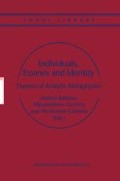Abstract
Many philosophers think that ‘What is identity across time?’ is an important and meaningful question. I have a great deal of trouble seeing what this question might be. But, very often, if one cannot understand a philosophical question, one’s best course is to look at some alleged answers to it; sometimes these answers enable one to see what question it is that they are offered as answers to. The following passage by Michael Tooley is supposed to provide an answer to the question we are trying to get at.
Access this chapter
Tax calculation will be finalised at checkout
Purchases are for personal use only
Preview
Unable to display preview. Download preview PDF.
Notes
The theory I am ascribing to Tooley is very like the theory I called “Theory 2” in van Inwagen [1990a], pp.245–55.
This is the theory I called “Theory 1” in van Inwagen [1990a].
Quine [1953], pp.65–79.
Achille Varzi has asked me several questions about my analysis of the role of ‘in 1850’ in the sentence ‘St. Paul’s in 1850 was dingy’. They could be summed up in this question: “Granted, ‘in 1850’ is not an adjective modifying ‘St. Paul’s’; but is the only alternative that it is an adverb modifying ‘was’? — are there not other possibilities?” According to the traditional grammar I was taught in school, the copula ‘was’ is “the verb of’ the sentence, ‘St. Paul’s in 1850 was dingy’ and ‘in 1850’ modifies it. But a more up-to-date grammar might tell us that when ‘to be’ functions as a copula, it does not belong to the grammatical category ”verb“ (despite the fact that ‘to be’, whatever its function, displays the grammatical accidence traditionally definitive of the category ”verb“: tense, voice, mood, aspect), but rather to the category ”takes an adjective and makes a verb.“ According to this view of the matter, the simplest verb in ‘St. Paul’s in 1850 was dingy’ is ‘was dingy’ — the past tense of the verb ‘to be dingy’ — and that ‘in 1850’ modifies ‘was dingy’ (applies to it to produce the complex verb ‘was dingy in 1850’). Another up-to-date view of the function of ‘in 1850’ in this sentence is this: ‘in 1850’ is not an adverb (a ”takes a verb and makes a verb“) at all, but a sentence-modifier, a representative of the grammatical category ”takes a sentence and makes a sentence“; in the present case, it modifies ‘St. Paul’s was dingy’. Which of these three accounts of the function of ‘in 1850’ is correct — if there is indeed a fact of the grammatical matter — makes no difference for our purposes, for each account has the consequence that ‘St. Paul’s in 1850’ is not a noun-phrase and hence does not represent itself as denoting an object. In the text, I presuppose the traditional view, but the correctness of the traditional view is in no way essential to my arguments. My arguments could easily be expressed in the terms provided by either of the ”up-to-date“ accounts of the function of `in 1850’.
A momentary property is a property an object could have at one time and lack at another — like being seated and being Socrates’ widow,and unlike being descended from King David.
This definition leaves open the question whether there may be parts of a person’s career that are “topologically unsuited” to being the careers of objects. Suppose, by suitable correlation of numbers with moments of time, we associate the domain of Descartes’s career with the real numbers 0 through 1, inclusive (we should be able to do this if there was both a first and a last moment of Descartes’s existence). Could the part of Descartes’s career whose domain is the rational numbers between 0 and 1 be the career of an object? A part whose domain is a set that has no Lebesgue measure? How about some relatively well-behaved (topologically speaking) but non-connected set? — say, one corresponding to March 1610 and Good Friday, 1633? These are questions that we can leave to the friends of temporal parts. How they are answered is irrelevant to our argument.
I ignore Kripkean scruples about whether what was apparently a human being that was created ex nihilo would really be a human being.
This paper first appeared in The Monist,83 (2000), p. 437–459 and then as Chapter 8 of van Inwagen [2001]. Some of the early parts of this essay (and a bit toward the end) are taken from my essay “Plantinga on Trans-World Identity,” in Tomberlin and van Inwagen (eds.) [1985]. Reprinted by premission: copyright © 2000, The Monist,Peru, Illinois, 61354.
Editor information
Editors and Affiliations
Rights and permissions
Copyright information
© 2002 Springer Science+Business Media Dordrecht
About this chapter
Cite this chapter
van Inwagen, P. (2002). Temporal Parts and Identity Across Time. In: Bottani, A., Carrara, M., Giaretta, P. (eds) Individuals, Essence and Identity. Topoi Library, vol 4. Springer, Dordrecht. https://doi.org/10.1007/978-94-017-1866-0_20
Download citation
DOI: https://doi.org/10.1007/978-94-017-1866-0_20
Publisher Name: Springer, Dordrecht
Print ISBN: 978-90-481-5988-8
Online ISBN: 978-94-017-1866-0
eBook Packages: Springer Book Archive

